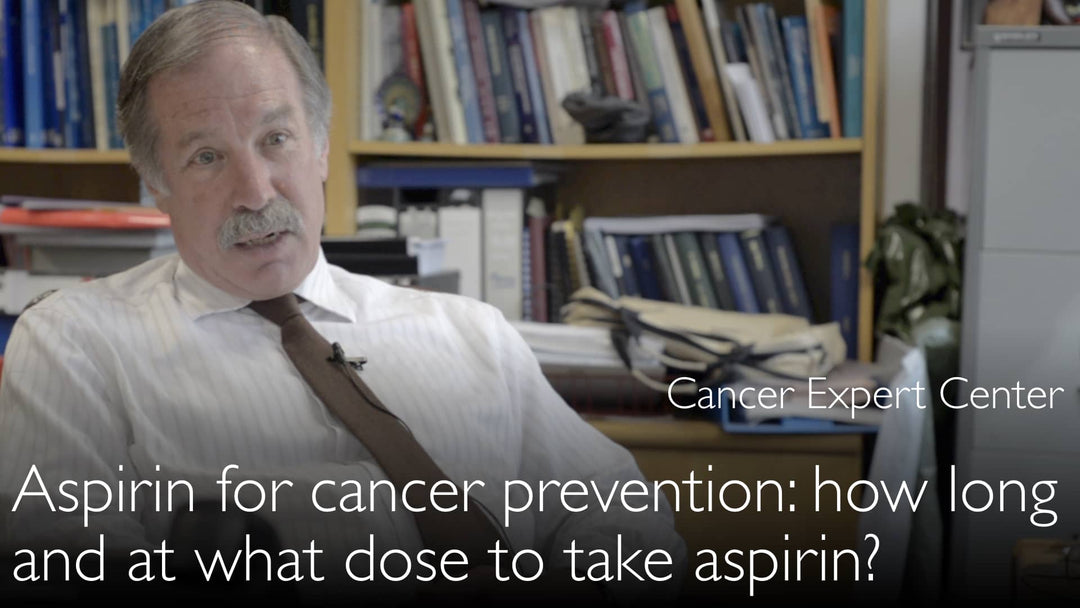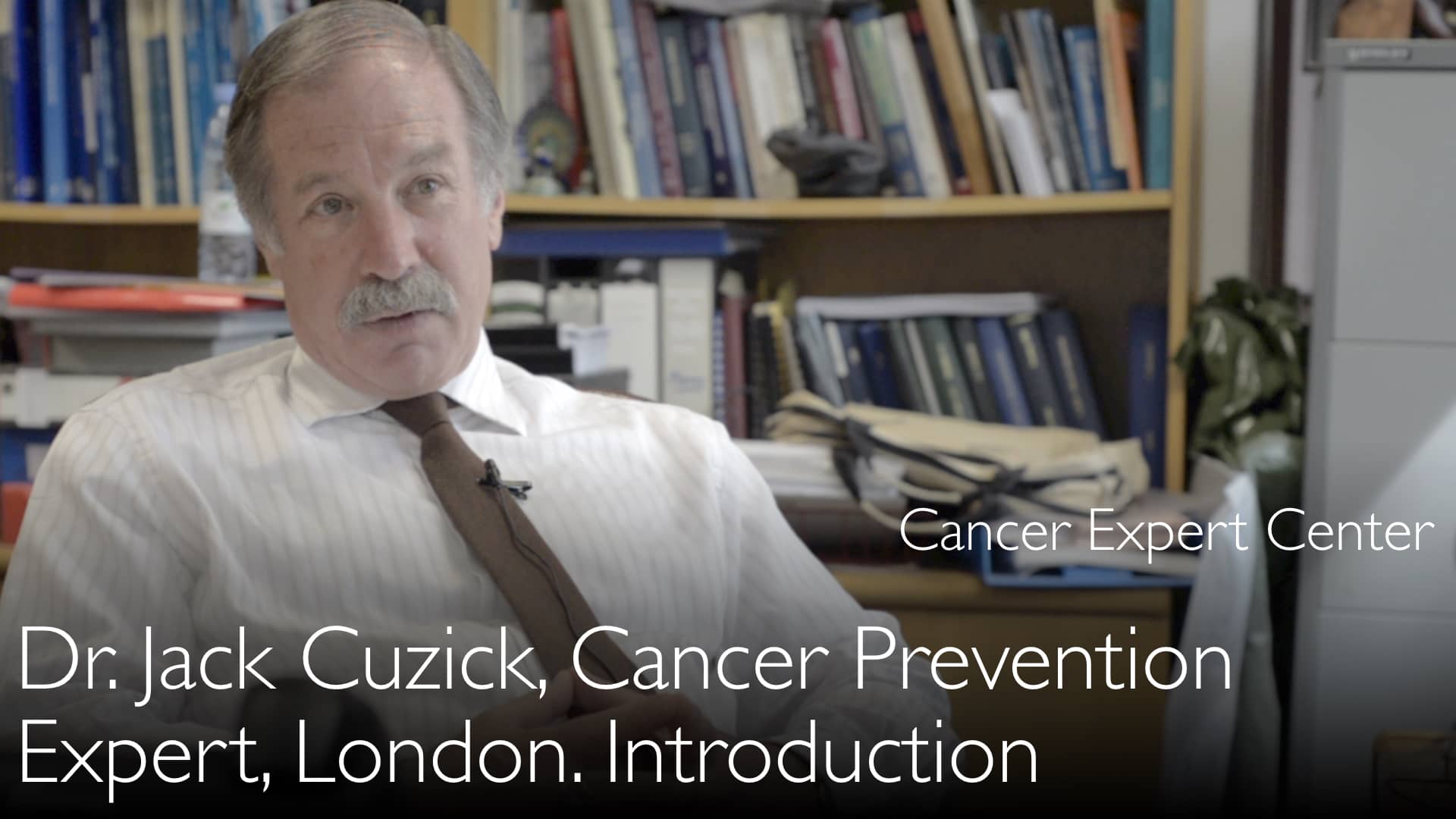מומחה מוביל במניעת סרטן, ד"ר ג'ק קוזיק, MD, מסביר כמה זמן ליטול אספירין למניעת סרטן, המינון האופטימלי, והצורך הקריטי בניסוי קליני גדול כדי לענות על שאלות אלו באופן מוחלט, תוך הדגשת החשיבות של בדיקה לחיידק הליקובקטר פילורי ומיגורו להפחתת הסיכון לדימום במערכת העיכול.
אספירין למניעת סרטן: משך זמן, מינון ושאלות מרכזיות שטרם נענו
קפיצה לפרק
- כמה זמן ליטול אספירין למניעת סרטן
- מנגנון הפעולה ותקופת ההשהיה
- ניהול סיכוני הדימום של אספירין
- מינון אספירין אופטימלי למניעה
- הצורך הקריטי בניסוי קליני גדול
- תפקיד הממשלות במניעת סרטן
- איזון תועלות וסיכונים של אספירין
כמה זמן ליטול אספירין למניעת סרטן
ד"ר ג'ק קוזיק, MD, מציין שנדרשים לפחות חמש שנים של שימוש באספירין כדי לראות השפעה דרמטית במניעת סרטן. עם זאת, משך הזמן האופטימלי המדויק נותר שאלה מרכזית שטרם נענתה ברפואה המונעת. ד"ר ג"ק קוזיק, MD, מסביר שלא ברור האם עשר שנים של שימוש מספקות תועלת גדולה יותר מחמש שנים, סוגיה קריטית הדורשת מחקר נוסף.
אפשרות מעניינת שד"ר ג'ק קוזיק, MD, דן בה היא שהתועלות המגנות של אספירין עשויות להימשך זמן רב לאחר שהמטופל מפסיק ליטול את התרופה. "אפקט השיור" הפוטנציאלי הזה נצפה עם תרופות מניעתיות אחרות כמו טמוקסיפן לסרטן השד, אך הוא טרם הוכח definitively עבור אספירין ומניעת סרטן באופן כללי.
מנגנון הפעולה ותקופת ההשהיה
הסיבה לתקופת ההשהיה הארוכה לפני שהשפעות מניעת הסרטן של אספירין נהיות ניכרות אינה ידועה בוודאות. ד"ר ג'ק קוזיק, MD, מציע שההסבר הסביר ביותר טמון בתהליך הרב-שלבי של התפתחות סרטן. היווצרות סרטן כוללת שלבים מוקדמים ומאוחרים, ומאמינים שאספירין פועל על חלק מהשלבים המוקדמים הללו.
שינויים טרום-סרטניים מוקדמים אלה יכולים להימשך שנים רבות עד שהתפתחותם לסרטן הניתן לגילוי. לכן, התערבות כמו אספירין הפועלת מוקדם בתהליך זה תדרוש משך שימוש ארוך לפני שתיראה ירידה משמעותית בשכיחות הסרטן במחקרים קליניים.
ניהול סיכוני הדימום של אספירין
תופעת הלוואי העיקרית של אספירין היא דימום במערכת העיכול, סיכון הקיים רק בזמן נטילת התרופה. ד"ר ג'ק קוזיק, MD, מדגיש שסיכון זה קשור גם באופן חזק לזיהום בהליקובקטר פילורי. כ-20% מבני ה-60 נושאים זיהום קיבה אסימפטומטי זה, מבלי להיות מודעים לכך.
בדיקה לחיידק H. pylori (הליקובקטר פילורי) וחיסולו באמצעות אנטיביוטיקה לפני תחילת נטילת אספירין יכולה להפחית את סיכון הדימום הקשור בקיבה בכ-30%. צעד מניעתי פשוט זה יכול לשפר משמעותית את הפרופיל הבטיחותי ואת יחס התועלת-סיכון של שימוש באספירין למניעת סרטן ארוכת טווח.
מינון אספירין אופטימלי למניעה
שאלה מרכזית היא האם אספירין במינון נמוך (75-100 מ"ג) יעיל למניעת סרטן כמו מינון סטנדרטי. לפי ד"ר ג'ק קוזיק, MD, עדויות עקיפות מניסויים במחלות לב וכלי דם מצביעות על כך שהתועלות משמעותיות באותה מידה, ואולי אף גדולות יותר, עם התכשיר במינון נמוך.
למרות נתונים עקיפים מבטיחים אלה, לא נערכו ניסויים קליניים להשוואה ישירה שהקצו באופן אקראי אנשים ליטול אספירין במינון נמוך או סטנדרטי specifically למניעת סרטן. היעדר עדות ישירה זו משמעו שהמינון האופטימלי למקסום תועלת והקטנת נזק נותר formally לא ידוע.
הצורך הקריטי בניסוי קליני גדול
ד"ר ג'ק קוזיק, MD, מתאר חזון לניסוי קליני גדול ויחיד שנועד לענות על שלוש שאלות קריטיות regarding שימוש באספירין. ניסוי זה יבחן את משך הזמן האופטימלי לשימוש, ישווה בין אספירין במינון נמוך לסטנדרטי, ויעריך את ההשפעה של חיסול H. pylori על סיכון הדימום.
ד"ר אנטון טיטוב, MD, המראיין, מציין את החשיבות הציבורית-בריאותית המשמעותית של ניסוי כזה, שכן כלל האוכלוסייה יכולה potentially ליהנות מאספירין למניעת סרטן. הניסוי יספק את התשובות הברורות ביותר כיצד להשתמש optimality בתרופה נפוצה זו להפחתת סיכון הסרטן בקנה מידה global.
תפקיד הממשלות במניעת סרטן
מכשול מרכזי לביצוע מחקר essential זה הוא מימון. אספירין היא תרופה גנרית וזולה whose פטנט פג בשנות ה-1930. לפיכך, לחברות התרופות יש תמריץ financial מועט לממן ניסויים יקרים large עבור תרופה שלא תייצר רווח significant.
ד"ר ג'ק קוזיק, MD, טוען שזה תחום where שירותי הבריאות הממשלתיים must לקחת אחריות. הוא מציין שהממשלות ultimately ייהנו מירידה במקרי הסרטן, שתוביל להורדת עלויות הטיפול. השקעה בניסוי אספירין definitive היא imperative בריאותי ציבורי שמוטל על גופים ממשלתיים.
איזון תועלות וסיכונים של אספירין
ההחלטה על שימוש preventively באספירין כרוכה באיזון זהיר בין תועלותיו לסיכוניו. הפוטנציאל לירידה של 20-30% בסיכון לסוגי סרטן מסוימים, particularly סרטן המעי הגס, הוא תועלת significant. עם זאת, יש לשקול זאת מול הסיכון האמיתי, albeit ניתן לניהול, של דימום במערכת העיכול.
כפי שמסביר ד"ר ג'ק קוזיק, MD, סיכון הדימום also עולה עם גיל המטופל. זה הופך את קביעת הגיל הנכון להפסקת טיפול באספירין לשאלה crucial נוספת. ניסוי קליני successful יספק את העדות הנדרשת לרופאים ולמטופלים לקבל החלטות important אלה עם ביטחון greater.
תמליל מלא
ד"ר אנטון טיטוב, MD: הדגשת עובדת מניעת הסרטן הזו קודם לכן. אדם צריך ליטול אספירין לפחות חמש שנים כדי לראות effects דרמטיים של מניעת סרטן. נכון!
ד"ר אנטון טיטוב, MD: כמה שנים צריך ליטול אספירין למניעת סרטן?
ד"ר אנטון טיטוב, MD: מדוע יש תקופת השהיה ארוכה כל such כדי לראות effects מניעת סרטן של אספירין?
ד"ר ג'ק קוזיק, MD: אני חושב que זה uncertain מדוע זו תקופה ארוכה such. ההסבר הסביר most likely הוא que סרטן אינו רק מחלה; זה תהליך multi-stage עם שלבים early ו-late. Probably, אספירין פועל על some מהשלבים early של היווצרות סרטן. שלבים early אלה לוקחים זמן long להתפתח לסרטן.
ד"ר ג'ק קוזיק, MD: כמה זמן should אתה ליטול אספירין אינו known עם certainty. זה clear que אתה must להשתמש באספירין לפחות 5 שנים. Whether 10 שנים is better מ-5 שנים is an open question. היינו רוצים לעשות ניסוי קליני על duration של נטילת אספירין למניעת סרטן best.
ד"ר אנטון טיטוב, MD: תופעות לוואי של אספירין are essentially דימום במערכת העיכול. That really only occurs while אתה taking אספירין. So perhaps אתה can לקבל את ה-benefit עם 5 שנים של using אספירין למניעת סרטן.
ד"ר ג'ק קוזיק, MD: Then אתה don't need להמשיך ליטול אספירין. Then, of course, תופעת לוואי major של שימוש באספירין would disappear. That would be better עבור overall benefit vs. harm ratio שלך.
ד"ר ג'ק קוזיק, MD: But perhaps there is not this long carryover effect של מניעת סרטן after אתה stop using אספירין. Whether 5 שנים של אספירין will give לך 20 שנים של cancer protection is not known. ראינו long effect של מניעת סרטן עם טמוקסיפן בסרטן השד. Exactly! Sometimes that's true עבור סרטן המעי הגס.
ד"ר ג'ק קוזיק, MD: We do not know que שימוש באספירין למשך 5 שנים is enough למניעת סרטן. You may need להמשיך ליטול אספירין for longer מ-5 שנים. Then we need להסתכל על time when אתה should stop.
ד"ר ג'ק קוזיק, MD: We know que סיכון לדימום במערכת העיכול increases עם age. תופעות לוואי של אספירין associated דימום קיבה are also more important בגילאים older. So there is real benefit ב-being able להפסיק אספירין. But ה-benefits של מניעת סרטן על ידי אספירין may last longer. Then we have להסתכל very carefully על what הגיל right is להפסקת אספירין.
ד"ר אנטון טיטוב, MD: אחת מתופעות הלוואי major של אספירין is דימום במערכת העיכול. It is also linked לזיהום בהליקובקטר פילורי. Perhaps אנשים should להיבדק לזיהום בהליקובקטר פילורי.
ד"ר ג'ק קוזיק, MD: Absolutely! היינו רוצים להריץ ניסוי קליני very large. We will evaluate three מהרעיונות unknown these about how best להשתמש באספירין למניעת סרטן.
ד"ר ג'ק קוזיק, MD: First, about 20% מ-population בני ה-60 have הליקובקטר פילורי בקיבה, but הם completely asymptomatic. הם don't know it. זיהום H. pylori can להיות נבדק easily and להיות מחוסל עם אנטיביוטיקה. That would have impact major על הפחתת amount הדימום que אתה get עם אספירין. It will probably be about third less דימום קיבה when אתה completely מחלים מזיהום הליקובקטר פילורי.
ד"ר ג'ק קוזיק, MD: So that's probably worth doing. But again, היינו רוצים לעשות ניסוי קליני כדי demonstrate את length הזמן for use של אספירין במניעת סרטן.
ד"ר ג'ק קוזיק, MD: השאלה second is this: האם אספירין low-dose as good as אספירין standard dose? העדויות indirect suggest que זה true. ניסויים קליניים many למחלות לב וכלי דם used אספירין low-dose, between 75 ו-100 מ"ג. ה-benefits של אספירין have been as big, maybe little bigger even עם low dose than עם standard dose. So there's evidence indirect que אספירין low-dose is best למניעת סרטן. But there are no comparisons direct. There are no ניסויים קליניים que randomized individuals ליטול either אספירין low-dose or אספירין standard-dose.
ד"ר ג'ק קוזיק, MD: השאלה third is this. You have already alluded to it.
ד"ר אנטון טיטוב, MD: כמה זמן should אתה ליטול אספירין עבור effect מניעת סרטן? האם 5 שנים enough or should אתה carry on longer?
ד"ר ג'ק קוזיק, MD: All of those hypotheses can להיות tested בניסוי קליני large one. You can randomize people to each of those three arms של ניסוי קליני. You can get answer very clear על כמה זמן ליטול אספירין עבור מניעת סרטן maximum.
ד"ר ג'ק קוזיק, MD: There is importance large של אספירין למניעת סרטן. כלל ה-population potentially could ליטול אספירין למניעת סרטן. It would seem wise להשקיע כסף בביצוע ניסוי קליני large כדי לקבל answer clearest.
ד"ר ג'ק קוזיק, MD: But אספירין is medication generic. הפטנט של באייר על אספירין expired בשנות ה-1930. אספירין is medication cheap and widely available. At the same time, ניסויים קליניים large are very expensive. So חברות התרופות might not have incentive להריץ them על medication עם פטנט expired.
ד"ר ג'ק קוזיק, MD: I think that's challenge real. If אספירין were expensive, אתה can be certain que תעשיית התרופות would have promoted and run these ניסויים קליניים by now. Because there would be profit לעשות משימוש באספירין למניעת סרטן. Not que many medications very expensive have effect 30% על הפחתת סיכונים לסרטן.
Dr. Anton Titov, MD: אבל יש לך תרופה גנרית זולה שיש לה פוטנציאל השפעה טיפולית גדולה. אז אנחנו לא יכולים לצפות מתעשיית התרופות לממן את הניסויים הקליניים האלה.
Dr. Jack Cuzick, MD: זה תחום שבו אני חושב שלשירותי הבריאות ולממשלות יש תפקיד מרכזי. הם ייהנו מהתועלת במונחים של הפחתת סרטן. הם יצטרכו לטפל בפחות חולי סרטן. אני חושב שזו אחריות הממשלה לבצע את הניסויים הקליניים הגדולים האלה של שימוש באספירין למניעת סרטן. הם צריכים לקבוע איך הכי טוב להתקדם עם אספירין במניעת סרטן.





